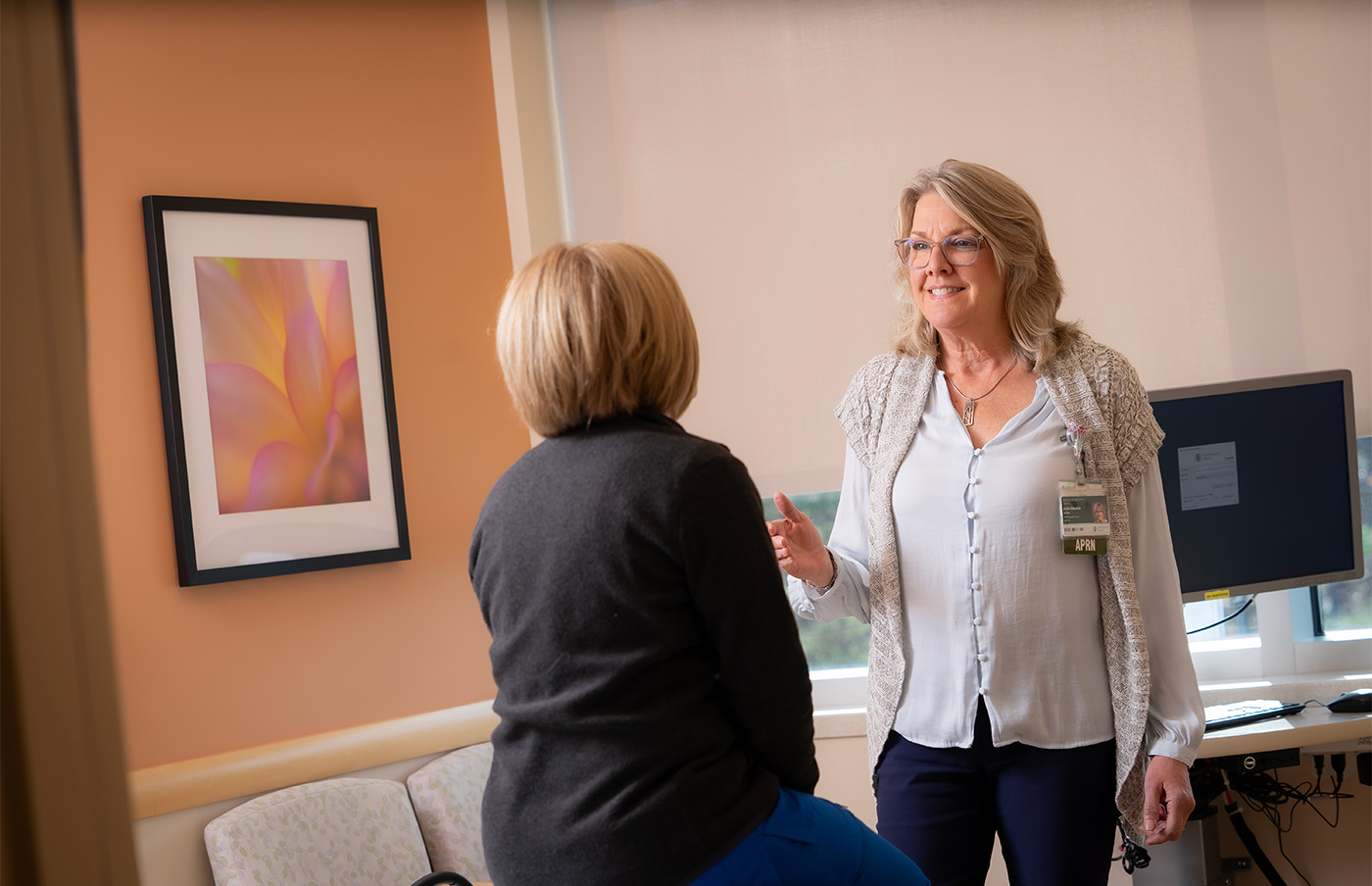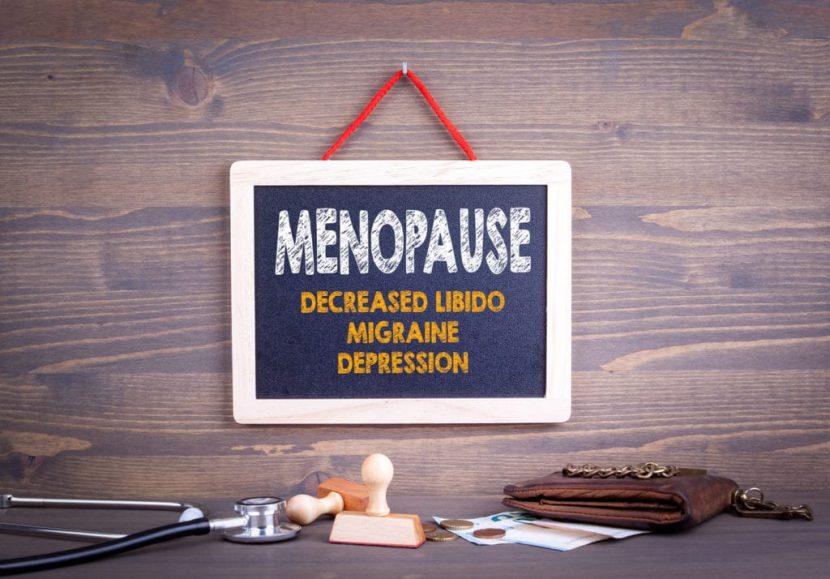“Women should not have to endure discomfort during menopause,” asserts Julia M. Stauble, MS, APRN, MSCP, who practices in Obstetrics & Gynecology at Dartmouth Hitchcock Clinics Nashua. Recently, Stauble achieved certification from The Menopause Society, an independent resource committed to enhancing women’s health and wellness experiences throughout and following the menopause transition. She notes that […]


“Women should not have to endure discomfort during menopause,” asserts Julia M. Stauble, MS, APRN, MSCP, who practices in Obstetrics & Gynecology at Dartmouth Hitchcock Clinics Nashua.
Recently, Stauble achieved certification from The Menopause Society, an independent resource committed to enhancing women’s health and wellness experiences throughout and following the menopause transition.
She notes that perspectives on addressing the signs and symptoms of menopause are evolving, and women should consult their healthcare providers to explore ways to navigate this potentially difficult phase of life.
What is menopause?
‘Thriving After 40: A Unique Look at Menopause: Don’t Suffer in Silence’
What: A complimentary discussion concerning menopause
When: Thursday, December 12
Time: 5:30 to 8 pm
Where: Dartmouth Health Medical Center, Auditorium H
To Register: Email Katelyn.M.Danner@hitchcock.org
Menopause signifies the permanent cessation of menstrual cycles, typically occurring between the ages of 45 and 55.
Per the nonprofit The Menopause Society, this period in a woman’s life presents sudden and frequently unforeseen changes that can affect her physical and emotional well-being.
Should this passage into a woman’s non-reproductive years be delayed due to medical interventions, surgical procedures, or other events, it occurs gradually across three stages:
- Perimenopause, the phase leading up to menopause
- Menopause, at which point a woman has not experienced a menstrual period for 12 consecutive months and ceases the production of reproductive hormones, estrogen, and progesterone
- The post-menopausal period, occurring after one has completed the 12 months of menopause.
Overall, this entire process may span as much as one-third of a woman’s lifetime.
Signs and symptoms of menopause
Menopause can be unsettling.
The impact of menopause varies for each woman. Signs and symptoms of this transition, detailed in this brief yet informative video, may encompass, but are not limited to:
- Hot flashes, night sweats, skin flushing, heart palpitations, dizziness, tingling sensations, joint and muscle pain, breast discomfort, dry skin or eyes, dry mouth, a frequent urge to urinate, mood fluctuation, irritability, depression, anxiety, forgetfulness, sleep disturbances, diminished interest in and pain during sexual activities, hair thinning or loss, and vaginal dryness.
Beyond these symptoms, menopause poses long-term health risks that are often linked to aging. These include:
- An increase in cholesterol levels
- A heightened risk of heart disease and stroke
- Loss of bone density, potentially leading to osteoporosis.
The concern is understandable
Recent research indicates that women frequently feel worried and unprepared as they transition into this commonly underestimated phase that can greatly influence their personal and career trajectories.
Shifting recommendations have failed to clarify how to manage the associated signs and symptoms.
In the 1960s, many women underwent hormone replacement therapy (HRT) to counteract the decline in hormone production and its effects. However, around thirty years ago, a significant women’s health study put the safety and perception of HRT into question.
This study resulted in a notable decrease in the number of postmenopausal women seeking hormonal treatment.
“It transformed our management of menopause,” Stauble remarks. “Moreover, many women were already hesitant to discuss this stage of their lives. This increased the stigma surrounding treatment.”
Hormone therapy is back on the table
In the past year, a significant change has occurred. A follow-up by the Women’s Health Initiative (WHI) found that the response to the women’s health study was exaggerated, especially for younger women experiencing menopause.
The evaluation concluded that the benefits of hormone therapy likely surpassed the risks associated with treatment when administered early in menopause to alleviate vasomotor symptoms such as hot flashes, night sweats, and sleep issues.
Consequently, healthcare providers are once again prescribing certain women FDA-approved hormone therapies that replace hormones diminished during the menopause transition, particularly estrogen and progestogen.
Is hormone therapy suitable for you?
Stauble warns that although studies indicate that various hormone treatments may address specific health issues, the associated risks and benefits can vary based on age and other biological factors.
For instance, women who have undergone a hysterectomy may receive estrogen treatment, while those with a uterus should also have progesterone or progestin (a medication similar to progesterone) to prevent the thickening of the uterine lining, which could increase uterine cancer risk.
Healthcare professionals may also refrain from initiating hormone therapy for women who are ten years post-menopause because of the heightened cardiac risk that can accompany aging, which is the leading cause of mortality among women.
Yet, even concerning cardiac risks, research findings can be perplexing. Recently, a study analyzing WHI data suggested that estrogen-based hormone therapy can have a beneficial long-term effect on heart disease risk.
“Ultimately, women must engage with their providers to evaluate the risks and benefits of hormone therapy and determine if it is appropriate for them,” Stauble stresses.
Alternative options for women
If hormone therapy is not suitable for you, numerous alternative treatments exist, but Stauble again emphasizes that these should be monitored and developed in consultation with a qualified healthcare provider.
Specifically, she advises women to avoid purchasing compounded hormones, like bioidentical estradiol products online without a prescription, as they lack FDA approval.
However, there are FDA-endorsed synthetic alternatives that have shown to be both safe and effective.
For women post-menopause, some healthcare providers might prescribe selective estrogen receptor modulators (SERMs), which aid in preventing and treating breast cancer and osteoporosis; preventing invasive breast cancer; slowing vaginal atrophy, bone degradation, and relieving hot flashes.
Topical and non-hormonal treatment options are also available, encompassing medication, supplements, and lifestyle and dietary adjustments.
One such treatment choice is local estrogen, which does not carry the same risks as oral formulations and can alleviate vaginal dryness and discomfort during sexual intercourse, which may also benefit from pelvic floor physical therapy.
Focus on nutrition
A balanced diet is crucial, especially for reducing the risk of health conditions like heart disease and osteoporosis that can arise as women age.
Ensuring adequate intake of vitamin D and calcium, managing cholesterol levels, consuming fruits and vegetables, limiting or abstaining from alcohol, and avoiding smoking are all known to positively affect long-term health.
Certain foods contain nutrients with estrogen-like properties. These nutrients, termed phytoestrogens, can be obtained from soybeans, chickpeas, lentils, flaxseeds, beans, grains, and other foods.
If dietary sources are inadequate, supplements—such as calcium with vitamin D for combating bone loss—can be beneficial. When suitable, healthcare providers may also suggest magnesium supplements to help with sleep difficulties and other issues.
Support your physical and mental well-being
In terms of lifestyle choices, Stauble advises maintaining physical activity and incorporating resistance training into your exercise regimen for the benefit of your bone health.
For maximum effectiveness, women ought to establish a regular workout routine starting during perimenopause or earlier, she advises.
Educational resources, support groups, classes, and workshops available through Dartmouth Health Women’s Health Resource Center can also enhance your understanding of menopause and reinforce the notion that you are not alone in this journey.
Additionally, if you find yourself struggling with your mental health, it’s important to seek assistance.
Life beyond menopause
“Menopause may represent a significant transition, but it should not prevent you from leading an active and fulfilling life,” asserts Stauble.
Therefore, connect with your healthcare provider to discover the most effective ways to manage this stage of your life.














